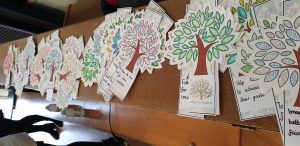Social innovation competence development Vol 3: taking action both on an individual and collective manner
Having the ability to activate individuals into achieving collective goals while being committed towards a shared vision even if efforts fail to produce results, is when groups become more effective and productive (collective efficacy). During the first piloting period, both teachers and students have emphasised how satisfied they feel to collaborate and thus help others to achieve a common goal. It was affirmed that the benefits of a collective mindset are being experienced by children and adults alike.
“Students have started using the “we have to” wording, including everyone. They realised that it is not an individual achievement but a collective one” (Director, CEIP Los Albares)
Even if efforts fail to produce results, teachers’ involvement in NEMESIS further reinforced their beliefs that they have to encourage their students and make them realise that they need to collectively keep on trying and that they are capable of acting and delivering results.
 What has evolved out of the first year’s evaluation was the fact that the collective efficacy competence is very much linked and should be looked together with the social resilience one, that is the ability to persevere, stay focused on the vision and be self-directed when witnessing a setback or failure. One of the most important contributions of resilience to people involved in social innovation is teaching them to look at problems consistently and consider the broader impacts of their ideas.
What has evolved out of the first year’s evaluation was the fact that the collective efficacy competence is very much linked and should be looked together with the social resilience one, that is the ability to persevere, stay focused on the vision and be self-directed when witnessing a setback or failure. One of the most important contributions of resilience to people involved in social innovation is teaching them to look at problems consistently and consider the broader impacts of their ideas.
The evaluation results have shown an evolution in children from a position of passive involvement, “a must be done” attitude, to a real and active involvement, whereby they make decisions, propose and act. When students’ ideas are valued and when they are given the autonomy to raise their voice has shown that this has contributed to developing a sense of social resilience that will make them determined and enable them to stay focused on their mission no matter the setbacks. However, it is not only that, as by increasing their voice, you are increasing their willingness to make efforts in order to apply the new knowledge and ideas developed by them. And this was evident in all pilot schools whereby students deeply understood that what was proposed by them was meaningful and were prepared to go the extra mile and apply their ideas, act upon their vision and bring social value to their mission by developing solutions that match the challenges that society is currently facing (Take the lead for value creation).
“They continue because they are clear about it, that their proposal for the future is a clean town, a town that recycles. One of the words that repeat the most is ecology, care of the earth, they will continue until they get it” (Director, CEIP Los Albares).
On top of that, what has also proven to be important is thinking more about a solution, making in-depth discussions, and listening to everyone about the different actions that could take place.
“NEMESIS not only made us think of the different and responsible ways we could help the visually impaired people in our neighbourhood but it was through this period of discussion that we realised of our future actions and so we made them real and acted towards them by sensitizing our community towards those people so that they too become responsible like us” (pupil, 1st Experimental School of Thessaloniki)
Another notable result refers to the motivation provided to students and the confidence gained throughout their involvement with NEMESIS in terms of engaging with the digital technology (digital social innovation) as well as organizing and mobilizing resources (human or financial) for achieving their vision and turning their collective ideas into action. It has thus been observed that little progress has been recorded on that end. This was mainly attributed to the subject of the projects that each school has decided to work on but most importantly on the age of the students. However, what is needed the most for being able to mobilise any such resources is time, effort and patience.
“Children in Rockingham school are part of the project, but they are not the one’s activating it because it’s so grown up. The funding aspects and the architect take some of it out of the children’s hands because they can’t do those things, which also reduces the amount of ‘organisation and mobilisation of resources the children can effect” (Jen Wall, NEMESIS observation team for UK).
The ability to effectively communicate and interact with others has proven to be an essential dynamic process of the NEMESIS model as students have been able to communicate effectively and negotiate with all stakeholders, uncovering each other’s needs to enhance understanding and be more effective in creating social value and perform purposeful and impactful actions (social communication). According to teachers’ testimonies, NEMESIS has been a catalyst towards students’ integration in groups, especially those with social and integration difficulties.
“What we have seen is that it has been especially positive for children with social problems. For some children it has been a path of integration, of enjoyment, of relaxation “(Director, CEIP Los Albares)

The generated adult-child relationship and interaction is thus further improving students’ social communication competences because they are becoming more adept at communicating with adults and adapt their behaviour accordingly to be able to do so. This relationship is also providing the opportunity to everyone involved to be a reflective learner, favouring in this way the continuous improvement of the ideas and solutions provided, as one of the most important elements for creating social value through their actions.
“I would improve what we’ve done this year…everything can be improved … and gather ideas from more students” (pupil, CEIP Los Albares)
As far as the competence of collaborative planning and democratic decision making is concerned, during the implementation period, it has received a high number of references from students and teachers to parents and other stakeholders involved. What is standing out is the joint decision making that takes place in NEMESIS between different and diverse participants, the level of decision making, being active listeners and most importantly, the leading role of students in the decision-making processes in the co-creation Labs without undervaluing anyone’s ideas and opinions.
“We all do the same, although some of us are older and others are younger, up to 6 years” (pupil, CEIP Los Albares)
“We were really pleased and amazed. We contributed the ideas and adults helped us improving them” (pupil, AE Maia)
All in all, even though the focus on assessing students’ competence development has been different in the five countries, one common outcome is that they see all competences being naturally developed in students through their involvement in the different activities of NEMESIS but in order to be able to witness a complete level of competence development more time is needed.
“NEMESIS is not so much about results but it rather puts kids in situations where they see and understand the problem, they are posing questions, and we are going to find together the solution we want to build. That’s the core. Adults adopt a different attitude and we will try together with kids to find a solution and also make them understand that even if it may not work in the end, they are still capable of acting on things” (teacher, École Ruffi)
And what stands out the most is that it is not only the outcome that matters but the process that you need to undergo and the setbacks you will encounter and be able to overcome as a group and continue, that makes this process valuable and important.





 Evaluation insights have shown that students have evolved from a position of ignorance to a position of interest and positive consideration towards the activities they were involved in and the ideas they were discussing. As such, they think that their learning makes a difference to their community and the wider world (vision for a better world). As the project and their activities evolved, students were able to envisage a better world by focussing on aspects they find unpleasant. Many students seemed to find it easier to think about ‘big’ problems such as world hunger, but they did not immediately view ‘smaller,’ more local issues as a problem that needs solving. Whenever the engagement of external stakeholders was constant and meaningful to them, students felt more motivated and highly inspired and were bursting with ideas about how to make the world a better place by simply following their examples.
Evaluation insights have shown that students have evolved from a position of ignorance to a position of interest and positive consideration towards the activities they were involved in and the ideas they were discussing. As such, they think that their learning makes a difference to their community and the wider world (vision for a better world). As the project and their activities evolved, students were able to envisage a better world by focussing on aspects they find unpleasant. Many students seemed to find it easier to think about ‘big’ problems such as world hunger, but they did not immediately view ‘smaller,’ more local issues as a problem that needs solving. Whenever the engagement of external stakeholders was constant and meaningful to them, students felt more motivated and highly inspired and were bursting with ideas about how to make the world a better place by simply following their examples. to improve them. However, the level of evaluating those ideas and responsibly acting towards accomplishing their goal was not that evident (responsible and critical thinking). This was expected given the different and, sometimes, challenging subjects that each of the schools and classes have been working on. Nevertheless, students have gained an increased sense of belonging and ownership. The fact that they are raising their voice and they have been heard making at the same time decisions of their own is of great value to them and make them more responsible and critical towards the subject they are focusing on.
to improve them. However, the level of evaluating those ideas and responsibly acting towards accomplishing their goal was not that evident (responsible and critical thinking). This was expected given the different and, sometimes, challenging subjects that each of the schools and classes have been working on. Nevertheless, students have gained an increased sense of belonging and ownership. The fact that they are raising their voice and they have been heard making at the same time decisions of their own is of great value to them and make them more responsible and critical towards the subject they are focusing on. AEMAIA (Portugal) has referred to her own experience, asserting that at first, she was unsure about her role but then her confidence and self-efficacy was building gradually. She was really surprised because initially she expected teachers would tell her what to do but that was not the case.
AEMAIA (Portugal) has referred to her own experience, asserting that at first, she was unsure about her role but then her confidence and self-efficacy was building gradually. She was really surprised because initially she expected teachers would tell her what to do but that was not the case.






